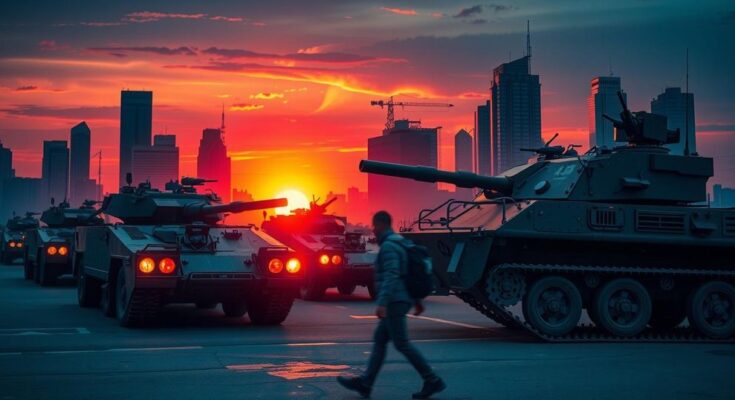The RSF leader, Mohamed Hamdan Dagalo, announced that his war against the Sudanese army is not over, despite being pushed from Khartoum. He confirmed a tactical withdrawal but vowed to return with renewed strength. Meanwhile, the army is solidifying its control, with ongoing humanitarian consequences for Sudan’s population.
Mohamed Hamdan Dagalo, chief of Sudan’s paramilitary Rapid Support Forces (RSF), declared that the conflict with the army is ongoing, despite his forces being largely driven from Khartoum. This statement marks Dagalo’s first communication since the RSF’s recent withdrawal, during which they were pushed back by the army in their enduring two-year conflict.
In an audio message on Telegram, Dagalo, also known as Hemedti, acknowledged the RSF’s tactical withdrawal from Khartoum, citing it as a collective decision made by his leadership. He confidently proclaimed the intent to return to Khartoum “stronger, more powerful and victorious.”
During this time, the Sudanese army has made significant progress by securing a major market in Omdurman, the city neighboring Khartoum where RSF previously operated. The army, aiming to strengthen its hold over the region comprised of Khartoum, Omdurman, and Bahri, now governs most of Omdurman, including pivotal military bases.
Sudanese army chief Abdel Fattah al-Burhan has expressed no intention of reconciling with the RSF, instead emphasizing a commitment to eradicate the paramilitary group. The ongoing conflict stems from a power struggle between the army and RSF, coinciding with a transition towards civilian governance.
The war has devastated Khartoum, forcing over 12 million individuals from their homes and contributing to severe hunger affecting nearly half of Sudan’s 50 million population. Current estimates suggest conflict-related deaths in Khartoum state may have reached around 61,000 over the initial 14 months of fighting.
In summary, the war between the Rapid Support Forces and the Sudanese army remains unresolved, with Dagalo asserting his forces’ intention to return to Khartoum. The situation reflects a significant power struggle contributing to a dire humanitarian crisis. The army’s consolidation of power highlights the increasing tensions within the region and the unresolved political landscape for Sudan’s future.
Original Source: www.usnews.com




